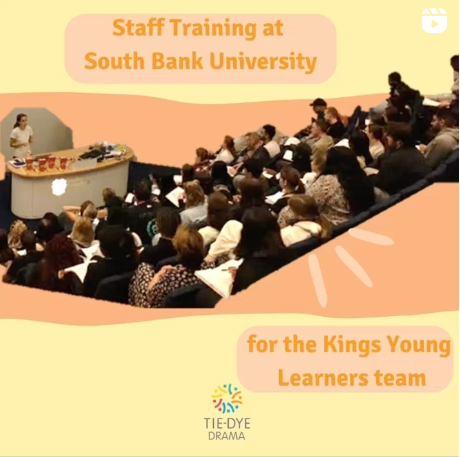Get Up Offa That Thing!
Learning Through Doing: How to get your staff to Get Up Offa That Thing!
Here’s why a seated, static staff training just isn’t going to work:
Reduced engagement - sitting still can cause lethargy, boredom and passive learning.
Diminished retention - research shows stationary learning does very little to improve recall and build neural pathways.
Limited focus - attention spans are shorter when sitting still for a long time especially without the use of a mental break.
So, what instead?
James Wilson, senior lecturer at Chichester University , reiterates that humans are hardwired to learn through doing.
At Tie-Dye Drama we wholeheartedly agree and stand (literally!) by that in our training. We use practical, engaging and immersive techniques to get our participants moving, talking and trying things out.
We’re working with organisations in delivering high quality training in playful and positive behaviour management. This training is particularly targeted at those at the start of their career, or those who would benefit from specific, continued professional development (CPD).
In July, we started an annual training programme with Kings Young Learners; a highly acclaimed international summer school operating throughout the county. We lead a training session on Drama and Play in Practice at South Bank University for about 40 teachers, activity leaders and house parents.
The results: in brief
Number of feedback forms completed: 29 (a big win for including the QR code on the last of my Canva slides!)
How likely are you to recommend Tie-Dye Drama to others? 1 being extremely unlikely, 10 being extremely likely : Average score= 9.5/10
Have you learned new activities/techniques that you would be able to implement?: 96.4% of staff said yes
3 words to describe the session: Engaging (23 people), Interactive (13 people), Entertaining/ Fun (14 people)
Individual feedback: “I have done lots of leadership roles before but never had training like this, it’s so so helpful to learn different techniques to engage people… I have taken a lot out of the session.”
After the session, I felt like a lowkey rockstar, with several members of staff approaching me at the end of the session, beaming with positive remarks. Indeed, when I checked the feedback forms and read comments like “It was very engaging and I feel so much more confident now!” I felt like I was ready to start writing my autobiography.
Of course, we’ve all been there, hyped after a training session. Feeling a new-found motivation and inspiration. Words underlined and circled in our notebooks. Ready to implement change.
And then… Monday morning arrives. We slip back into our routines, notes hastily glanced at, or just lost altogether and the energy fades. I’ve been to a few of these training sessions (and a lot on the other boring end, too) and I knew I wanted the Tie-Dye Drama training to be different. I wanted the energy to last, hold longevity and for it to actually be useful. So when the KYL training manager told me that, unlike any other training they had run, he’d had staff members talking about the session weeks after and had seen the activities in action, I knew this format was onto a winner! From this pilot, Tie-Dye Drama has now set up an ongoing collaboration with KYL, with TDD being asked to run 2-3x more training/workshop sessions over the next school holidays.
So, what did we do that worked?
Pivoted and adapted.
Initially the whole training was to be run in a workshop, big room format. However, owing to several factors it was necessary to change the space for the first part of the session to a lecture theatre. Whilst maintaining the Tie-Dye Drama integrity, we switched up the style. Rather than forcing participants to adapt to our initial plan, we adapted to meet what would be their needs and interests.
2. Used eye catching slides.
One word: Canva. It’s so easy! The easy-to-edit formats gave the presentation a real step up from my previously planned powerpoint presentation.
3. Participants learned through doing.
Throughout the first half of the session, I lead the group through activities useful in: Basic behaviour management and team strengthening, starting the day, getting to know each other, energisers and calming techniques. We played the activities practically, with participants being invited to then contribute and lead parts of the activities themselves.
A Tie-Dye Drama favourite is adapting and extending Pip Wilson’s Blob Tree ; particularly useful in reflecting upon mindset before, during and after training sessions.
4. Provided time to reflect.
After each themed activity, participants were given the opportunity to chat to the people next to them and discuss when a particular activity might be used, when and any foreseeable challenges. We then opened up this discussion as a wider group.
5. Acted it out!
During the break between the first half (learning and practising the activities) and second half of the training, I asked staff to write down upcoming potential scenarios they felt concerned about. I then grouped these answers into themes and we addressed them using forum theatre; an interactive theatre tool which involves the ability to pause and rewind scenes in order to implement audience suggestions.
For example: Some activity leaders were worried about losing young people whilst on a trip to London. The scene was acted, resulting in the teachers unable to self regulate and completely losing their cool! The audience were asked to rewind back to the problem’s build up and to suggest ideas (either by calling them out, or by stepping into the scene) as to how this situation could be avoided.
Regarding drama and forum theatre, James Wilson comments, “I haven't come across a medium of teaching which attaches a higher state of emotion to learning experiences”.
Find out more by watching the training session Instagram reel .
Interested in booking a Staff Training session? Email us on hello@tiedyedrama.co.uk or get in touch via the contact form. We’d love to hear from you!





